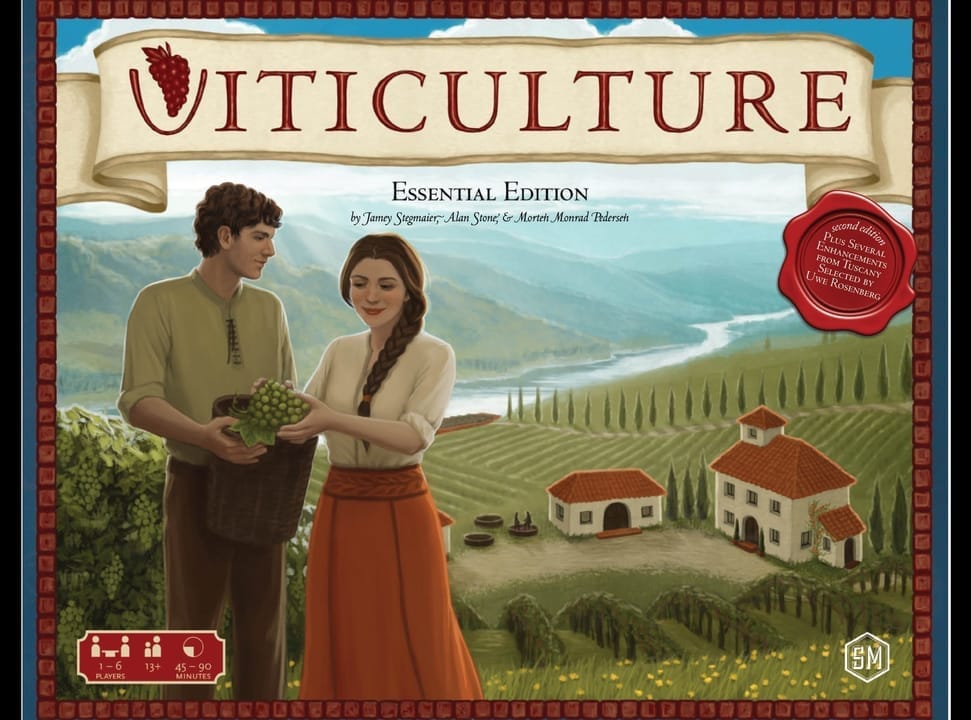I've been waiting to play Viticulture for a long time. It's actually the first game that I sent a proper request for a review copy after I started writing boardgame reviews. Since we were relatively new to the boardgame review scene, Jamey Stegmaier, one of the designers of the game and one of the owners of Stonemaier Games, looked over TechRaptor and decided that Euphoria would probably be a better fit for us to review. Over time the amount of review content that has been made available to us has picked up exponentially, but in that time I always held on to a desire to get my hands on a copy of Viticulture. I don't even like wine, but something about the game simply appealed to me.
Fast forward to over two years later (wow, has it really been that long since I started reviewing games?) and I finally got my chance to sit down with, and dig in to, Viticulture. You know what? This game is rad. I love it. I don't know how much of my own love affair with the game is because I've always wanted to play it and expected it to be good, and it lived up to my expectations, or because it's just a really solid game, so keep that in mind as you read the rest of this review. I will say that I always poll my game group about their feelings on the games we play, and what score they would give to a game, and they all agree with the score I'm giving it, even if they aren't quite as enamored with it as I am.
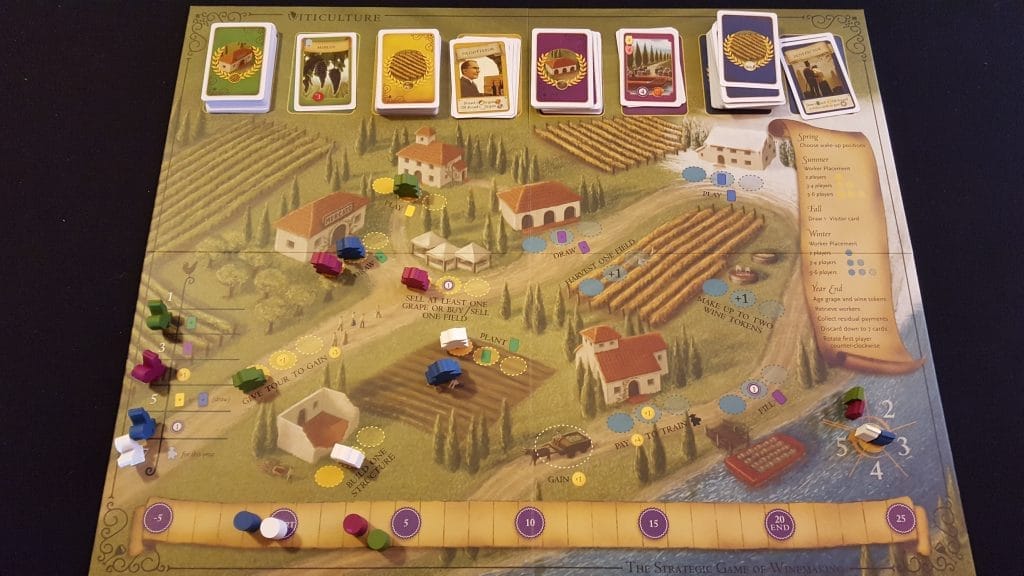
Viticulture is a worker placement game that pits players against each other as owners of vineyards in pre-modern Tuscany, and tasks them with being the first player to score 20 points. Players allocate their workers to plant Grapes, expand their vineyard, make wine, and fill Orders for that wine across rounds that encompass the four seasons of the year. The game is built around a very standard worker placement mechanic; there are a limited number of spaces to place your workers, and if you are too slow you can get blocked out of taking actions, but there are a few brilliant little tweaks here and there that add a huge amount of crunch to the game.
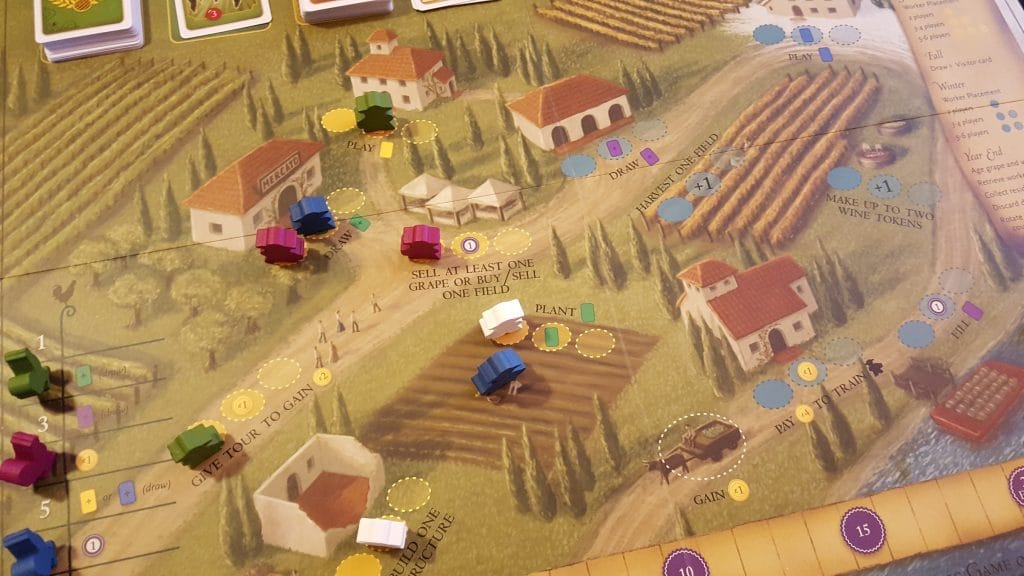
First and foremost is the Grande Worker. Like most worker placement games, when a spot has been taken by a worker it becomes blocked to other workers. In Viticulture each player has a Grande Worker; an oversized dude who can go where he/she wants. You can't stop the Grande Worker, you can only hope to contain him, but you can't do that either. A huge layer of the strategy in this game is deciding how and when to use your Grande Worker. Saving your Grande Worker for your last play each round is ideal, but sometimes you need to take a certain action to continue with your plans. It can be excruciating to make the call and play this guy early in a round only to find yourself locked out of something else you needed to do later, but it can also be a frustration-saving blessing to be able to slam the Grande down and complete some well laid plan. Why can't you simply save the GW for last every time? Well, it boils down to how the game round is split into seasons.
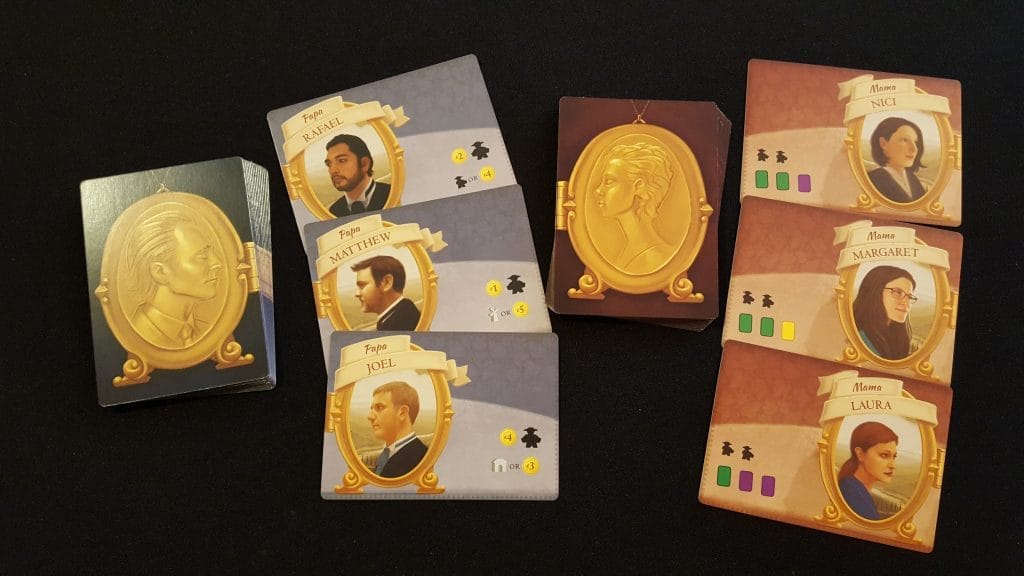
Each round of Viticulture is played over one year, split into the four seasons. In the Spring, players decide turn order by placing their Rooster meeple on the bonus that they would like to receive. There is a first player token, but it serves only to remind players of the order that they will be placing their Rooster in the Spring. The positioning of the Rooster actually determines the order in which players will place their workers in the Summer and Winter. It can be tempting to go for some of the tastier rewards at the bottom of the turn-order track, but you need to balance that against your need to get to the juiciest worker placement spaces before anyone else.
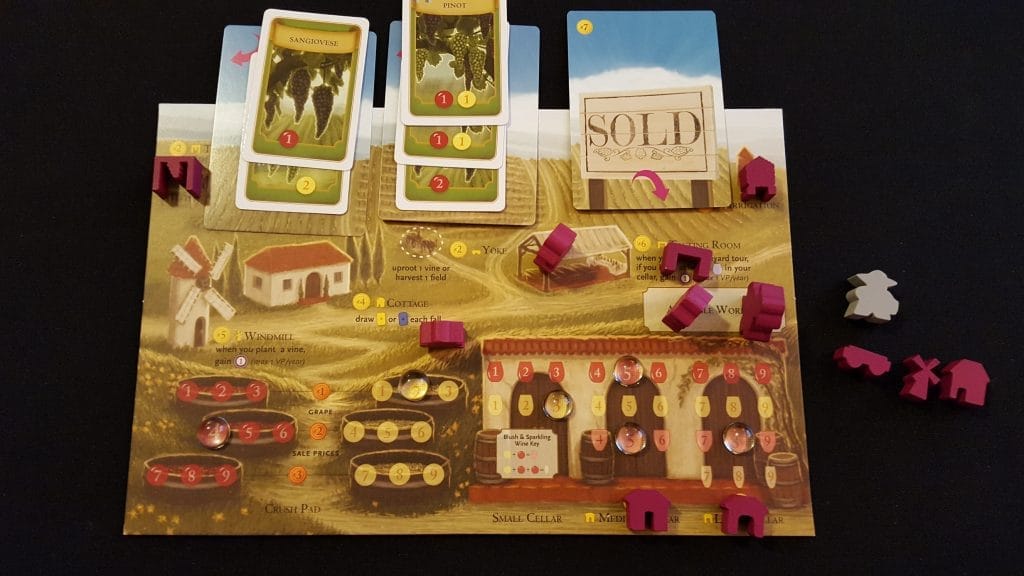
Once turn order has been decided in the Spring play proceeds to Summer, where players have access to half of the board. In the Summer, players can play Summer Visitor cards, draw new Grape cards, plant those cards in their fields, Build buildings to expand their vineyards, sell grapes or give Tours of their vineyards. Summer is really about preparation, and early in the game the main competition for spots to place your workers is going to be here as players try to fill their fields with grape vines and expand their winery to accommodate more valuable grapes, and more complex wines.
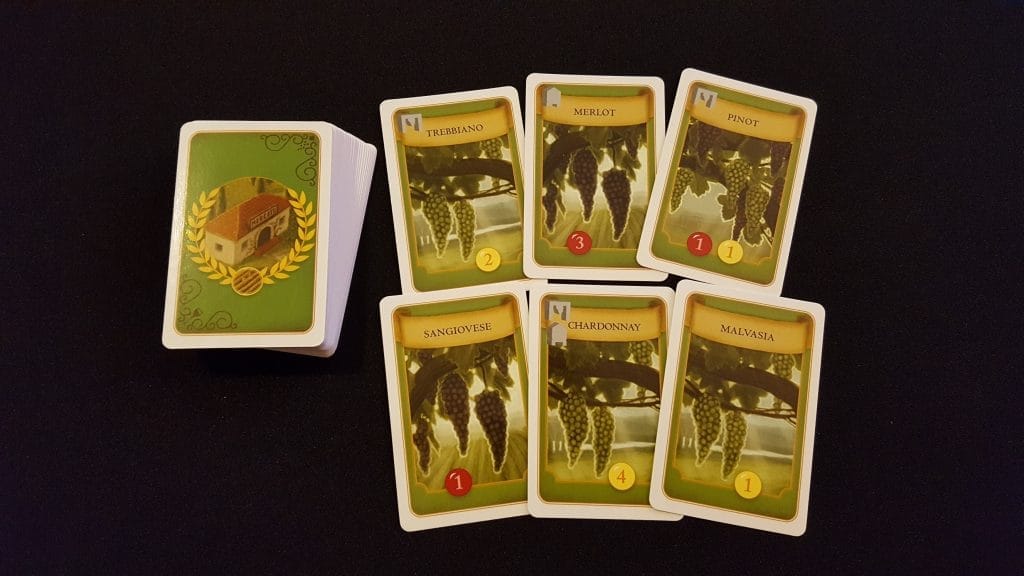
The Fall phase is simple and doesn't last long. In this phase players decide whether they want to draw a card from the Summer or Winter Visitor decks. These cards can be played during those phases, if players place workers on the appropriate spaces of course, and they usually let the players break the rules of the game in some small way, or they give players bonuses or some choice of things to gain or accomplish. Visitor cards often give the same benefits of the board spaces, usually at a reduced cost or an increased benefit, and so they provide yet another way for players to accomplish things even when the spaces they need are occupied.
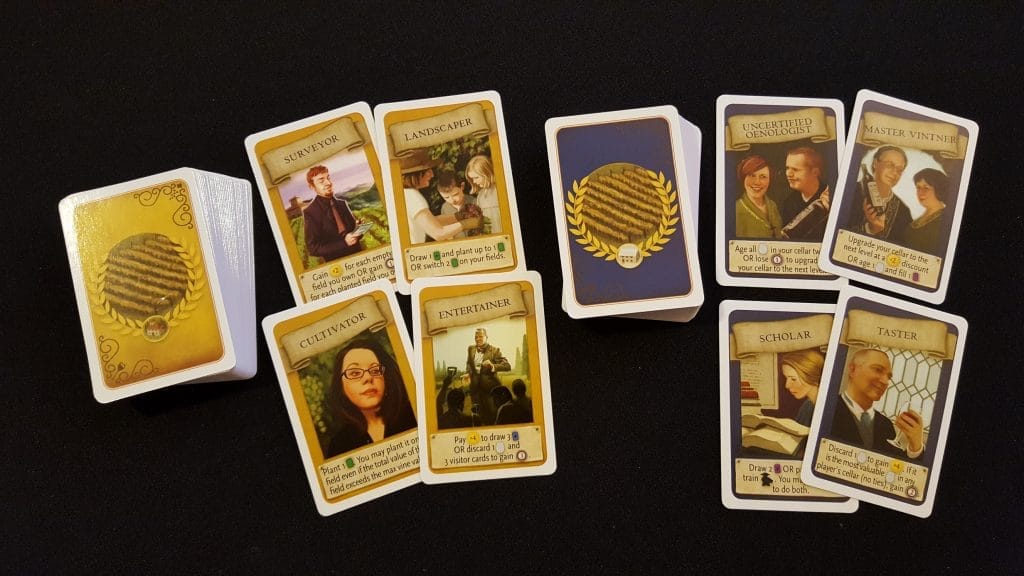
Once Winter rolls around the second half of the board unlocks, allowing players to Harvest their planted Grapes, turn those Grapes into Wine, Train new workers, Draw wine Orders, and Fill those Orders. The Summer spaces are off limits in the Winter, and players only have workers available to them that they didn't play in the Summer, so there is always a balancing act between dedicating your workers to actions in the Summer, and holding them back to take actions in the Winter. As the game progresses, more and more of the action shifts to Winter as players start to build up reserves of wine in their cellars. Shipping wine to Fill Orders grants some immediate sum of points, and also grants the player an amount of Residual Payment. Unless you take an action that straight-up grants you coins, like giving a Tour or taking the Gain $1 space that is always available both Summer and Winter, these payments (which come at the end of each year) will be the players' most consistent source of income.
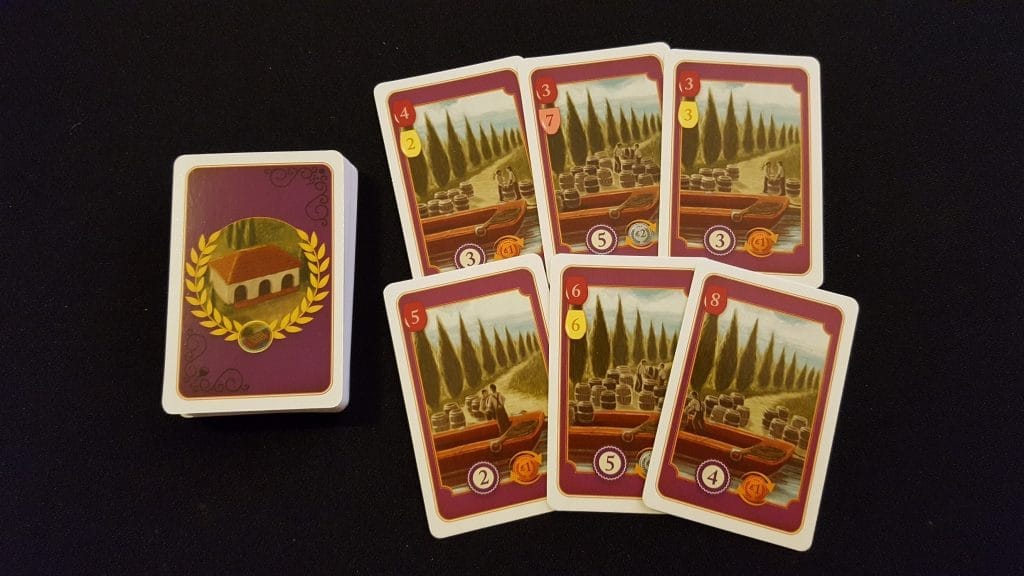
Points are king in Viticulture though, and players need to make sure that they keep an eye on both the points that they can score and where their opponents are on the score track. The game-end is triggered as soon as someone reaches the magic "20 points" mark, with the winner being the player with the most points at the end of the year in which anyone passes 20, so you need to stay aware of what your opponents are doing and where they sit on the score track. Even with the presence of Grande Workers it is possible, and necessary, to block opponents' access to the spaces that you know that they need. Viticulture doesn't have a cutthroat level of competition built in, but the competition is present and in fine feather, and it keeps the game tense and exciting across multiple plays.
A note on solo play: Viticulture Essential Edition has a solo mode that plays very well, and makes learning the game in order to teach it to other players very easy. The solo mode is a race against the clock, rather than a race to beat your opponents to 20 points, so it does feel quite a bit different than playing with people, but it plays very smoothly and provides a fun, and tense, game session for when you don't have other people to play with.
A note on “chrome”: Viticulture Essential Edition has great components. The wooden pieces are amazing, the art style is great, and the rulebook makes learning the game a breeze.
The bottom line:
Viticulture Essential Edition is great. It's easy to learn, and straightforward to play, but it offers a huge amount of strategy and replayability, especially with the asymmetric starting resources given via the Mama and Papa cards. The word elegant gets thrown around a lot when describing great Euro-style boardgames, and so I try to shy away from using it, but Viticulture is just that; elegant. Viticulture is a ton of fun, but also manages to feel more mature than the average boardgame thanks to a combination of the theme and art style. It doesn't scream "Boardgames aren't just for kids.", but it manages to hammer that point home with style and grace. I'm enamored with this game, and I find it easy to recommend to anyone who enjoys worker placement games.
Get this game if:
You like Euro games.
You like wine.
You like worker placement games.
You are looking for a great game with a grown-up theme that can get new players into the hobby.
Avoid this game if:
You have to roll dice to have a good time.
You hate worker placement.
The copy of Viticulture Essential Edition used for this review was provided by Stonemaier Games.
Review Summary
Viticulture Essential Edition is aptly named. This game is practically essential to your collection if you enjoy worker placement games.
(Review Policy)Have a tip, or want to point out something we missed? Leave a Comment or e-mail us at tips@techraptor.net
